
views
Signs Hummus Is Spoiled

Sour smell If the hummus has an acidic, sour, or rancid smell, it’s likely gone bad. Hummus should have a nutty and earthy smell (followed by any herbs or flavorings within the product). Discard any food product that has a foul or unpleasant smell.

Sour taste If the hummus tastes off or very pungent, it’s most likely spoiled. Hummus typically has a nutty, lemony, or garlicky taste (unless otherwise flavored). Throw away any hummus that tastes foul or rancid.
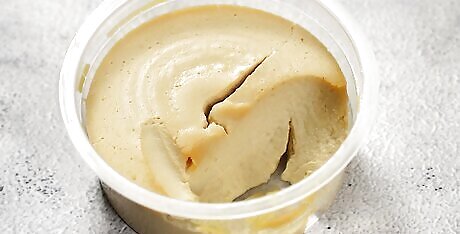
Hard consistency If the hummus is hard, flaky, or sandy, it’s more than likely gone bad. Hummus normally has a smooth and creamy consistency. If the food has an abnormal texture, it’s best to throw it out.

Mold If black, white, or green spots or fluff are on the surface of the hummus, it’s time to throw it out. This is likely mold and is a clear indicator that the hummus has gone bad and should not be consumed. Avoid scooping out the area of mold and eating the hummus. When mold is present on the surface, it’s likely to spread through the entirety of the food.
How long does hummus last?
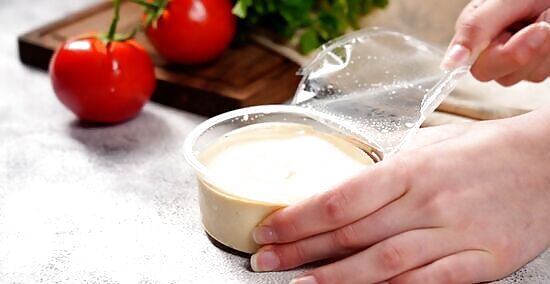
Store-bought hummus lasts up to 7 days in the fridge after it’s opened. Once a tub of hummus is opened or unsealed, it starts to expire. Aim to use the hummus within 7 days for the best freshness and taste. If signs of spoilage occur before 7 days (mold, foul smell, undesirable taste, and hard texture), toss the product out.
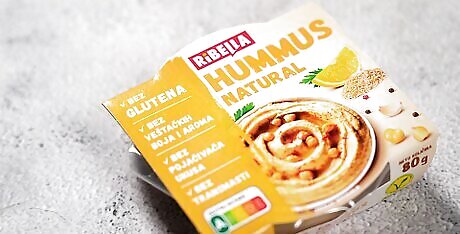
Unopened store-bought hummus lasts up to 3 months after purchase. A tub of store-bought hummus has a “Best By,” “Sell By,” or “Use By” date printed on the packaging. This date is merely a suggestion of when you should use the product by—it indicates when the product is freshest, not when the product truly expires. Because of this, you can use unopened hummus within 3 months of purchase, not by the product date. If the hummus shows signs of spoilage (mold, foul smell, and undesirable taste), avoid using it, even if it is not near the product date or isn’t past 3 months since purchase.
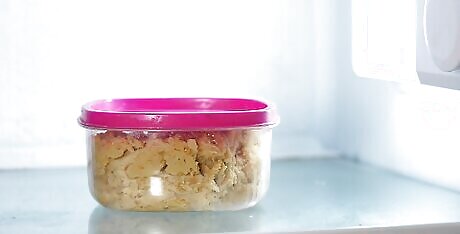
Homemade lasts up to 7 days in the fridge. Unpasteurized hummus with no preservatives should be eaten within a week of making. If the hummus shows signs of spoilage (mold, foul smell, undesirable taste, and hard texture) before then, discard immediately and do not use. Always store homemade hummus in an airtight container in the refrigerator.
How long can hummus sit out?

Hummus can sit out for 2 hours at most. Regardless of whether your hummus is homemade or store-bought, it’s best to always put it back in the fridge after use. Hummus shouldn’t be left at room temperature for longer than 2 hours, as prolonged air exposure and warm temperatures can cause it to spoil faster. If it’s over 90 °F (32 °C), aim to only keep the hummus out for 1 hour. If you’re having a party or get-together, rather than leaving the whole tub of hummus out, scoop a few servings into a separate dish and store the rest away for later. This way, you can restock with fresh hummus and never risk the chance of your guests eating spoiled hummus.
What happens if you eat expired hummus?

Expired hummus may be OK to eat, but spoiled hummus causes food poisoning. While there’s no immediate harm in eating an expired product, there is still a slight risk. The dates listed on food products (“Best By,” “Use By,” and “Sell By”) indicate when a product is at its freshest, not when it expires. So, it’s typically safe to eat hummus if it’s past the date listed and doesn’t show signs of spoilage. However, it’s extremely unwise to consume hummus that shows signs of spoilage (mold, foul smell, undesirable taste, and hard texture). Eating spoiled hummus can lead to food poisoning and make you sick. Signs of food poisoning include stomach pain, cramps, diarrhea, nausea, vomiting, and fever. It can take anywhere from a few hours to a few days for symptoms of food poisoning to appear, depending on the type of food poisoning-causing bacteria ingested.
How to Properly Store Hummus
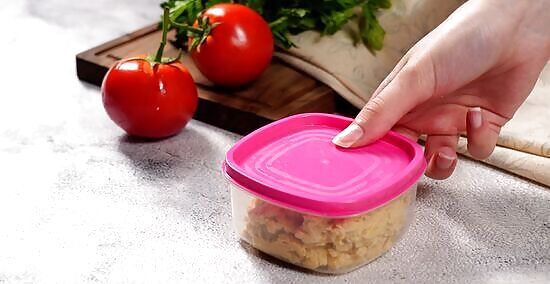
Store hummus in an airtight container in the refrigerator. Whether your hummus is opened or sealed, it’s always best to keep it in the fridge to prevent spoilage. Hummus is best kept in 40 °F (4 °C) or below. Along with this, be sure the hummus is in an airtight container or packaging. This prevents air from getting into the hummus, helping it stay fresher longer. This applies to store-bought or homemade hummus. Once you open store-bought hummus, transfer it into an airtight container or bag if it’s not already in a resealable container.
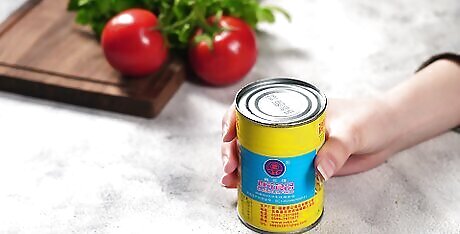
Store unopened canned hummus at room temperature. Shelf-stable goods don’t have to be refrigerated (unless specified on the product’s packaging). Because of this, unopened canned hummus can last at room temperature until opened. Once opened, transfer the hummus into an airtight container and store it in the fridge. Store unopened canned hummus in a cool, dry place so it stays fresher longer. Shelf-stable foods can last years past the date listed on the can, as long as the can is in good condition (no rust, dents, or swelling).
Can you freeze hummus?
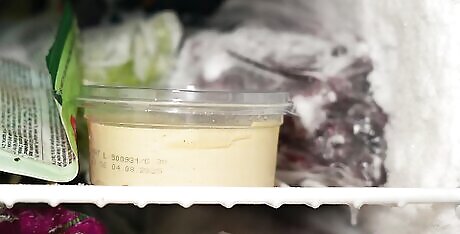
While it’s possible to freeze hummus, it isn’t recommended. Hummus can be frozen, but freezing the product could change its taste and texture. Hummus is typically composed of one part solids and one part liquids. When water freezes, it expands and creates ice crystals. When the water thaws, the ice crystals melt and the particles deflate. This causes frozen foods to become mushy and watery when thawed. So, while it is possible to freeze hummus, the process of freezing can throw off the consistency and flavor. If you choose to freeze hummus, consider using it to make blended dips or sauces to minimize the change in consistency.
How to Use Hummus

Use up opened hummus with a charcuterie board or tasty pasta sauce. Hummus isn’t just for dipping—it can also be added to meals for a burst of nutty flavor! Check out some of these ways you can use hummus before it spoils: Add hummus to pasta primavera for a creamy, nutty sauce. Spread hummus on pizza in place of red sauce for a Mediterranean flair. Mash sweet potato flesh with hummus for a creamy sweet potato mash. Use hummus in place of mayonnaise when making potato salad. Mix tzatziki with hummus for a Greek-inspired dip on a charcuterie board.

















Comments
0 comment